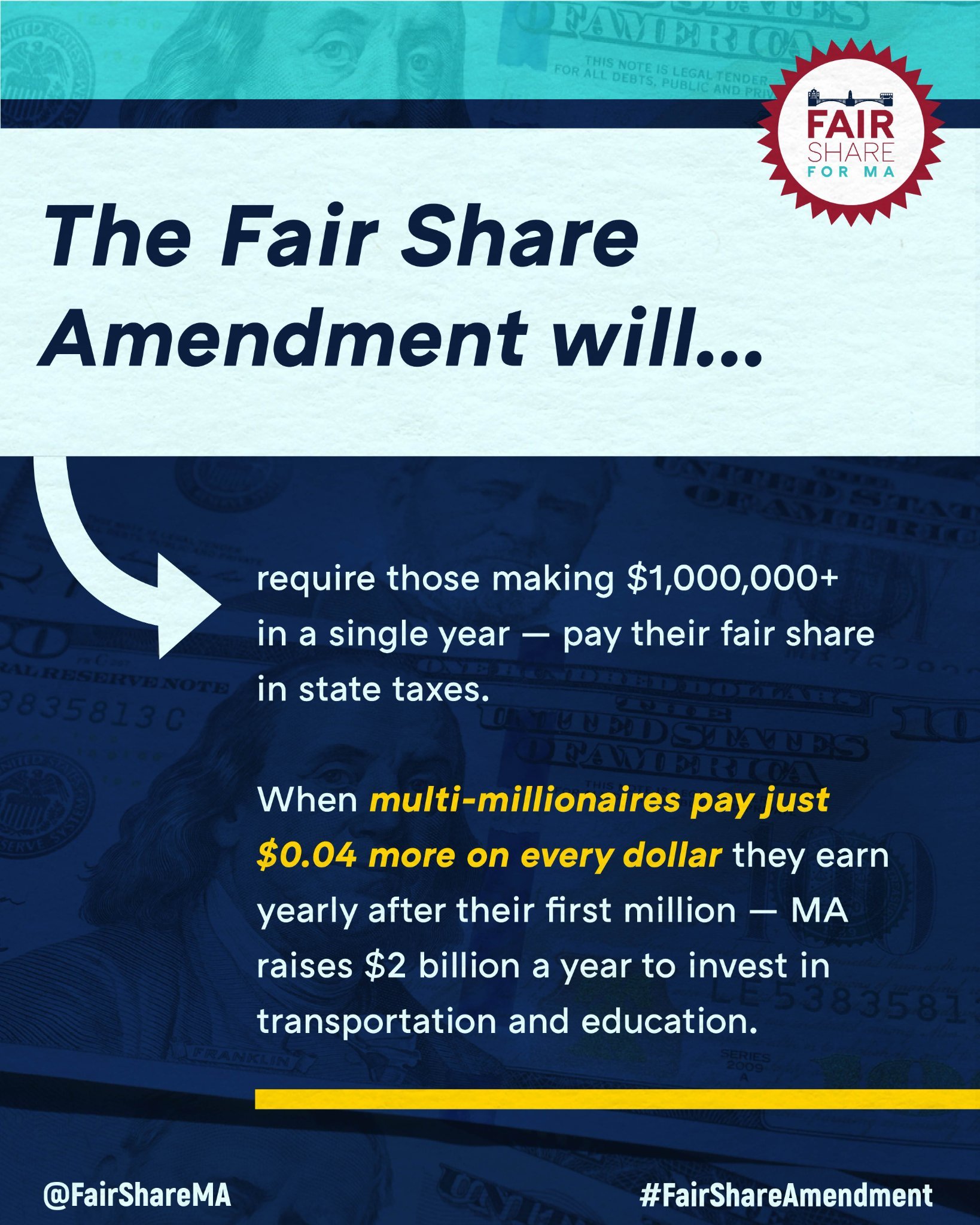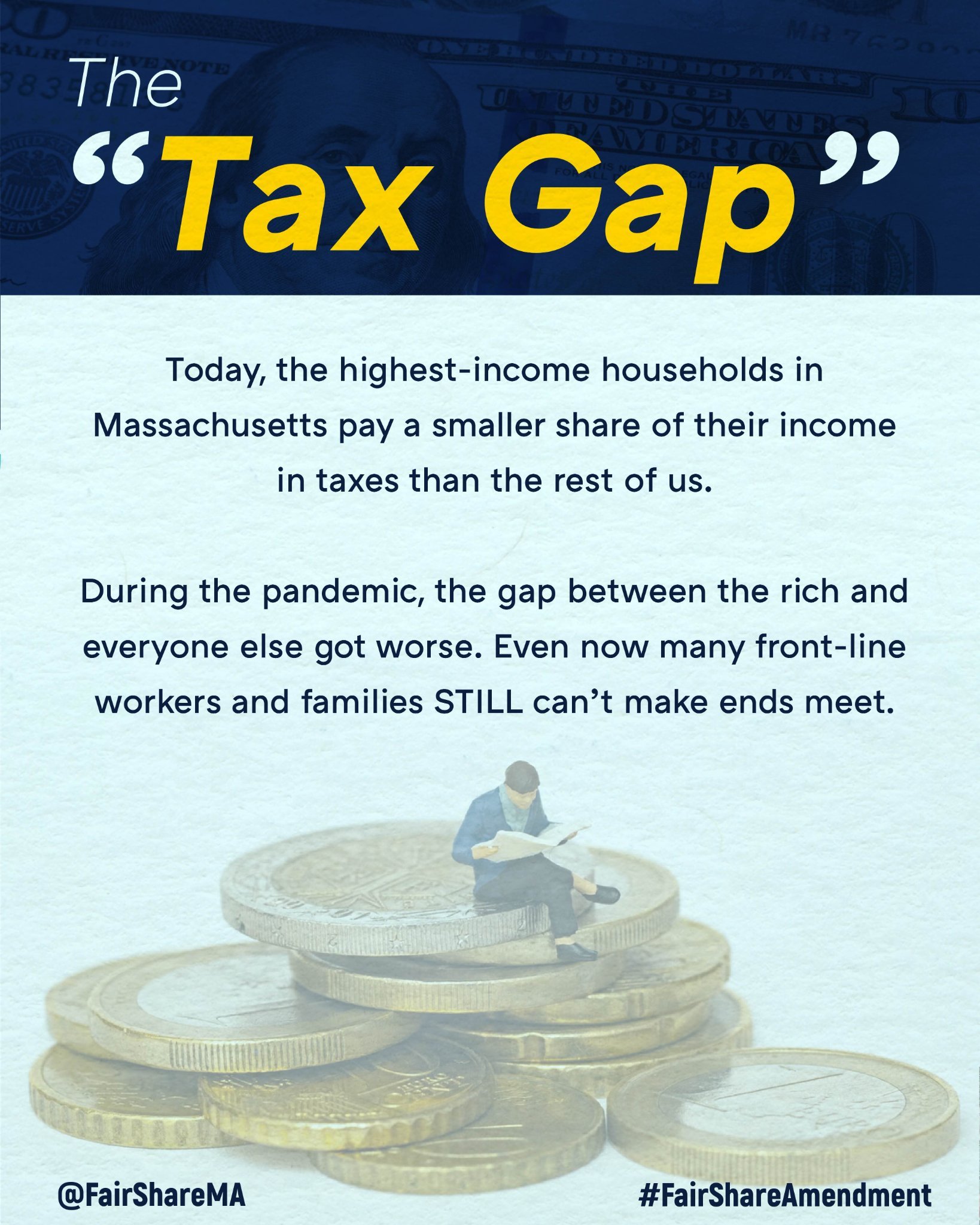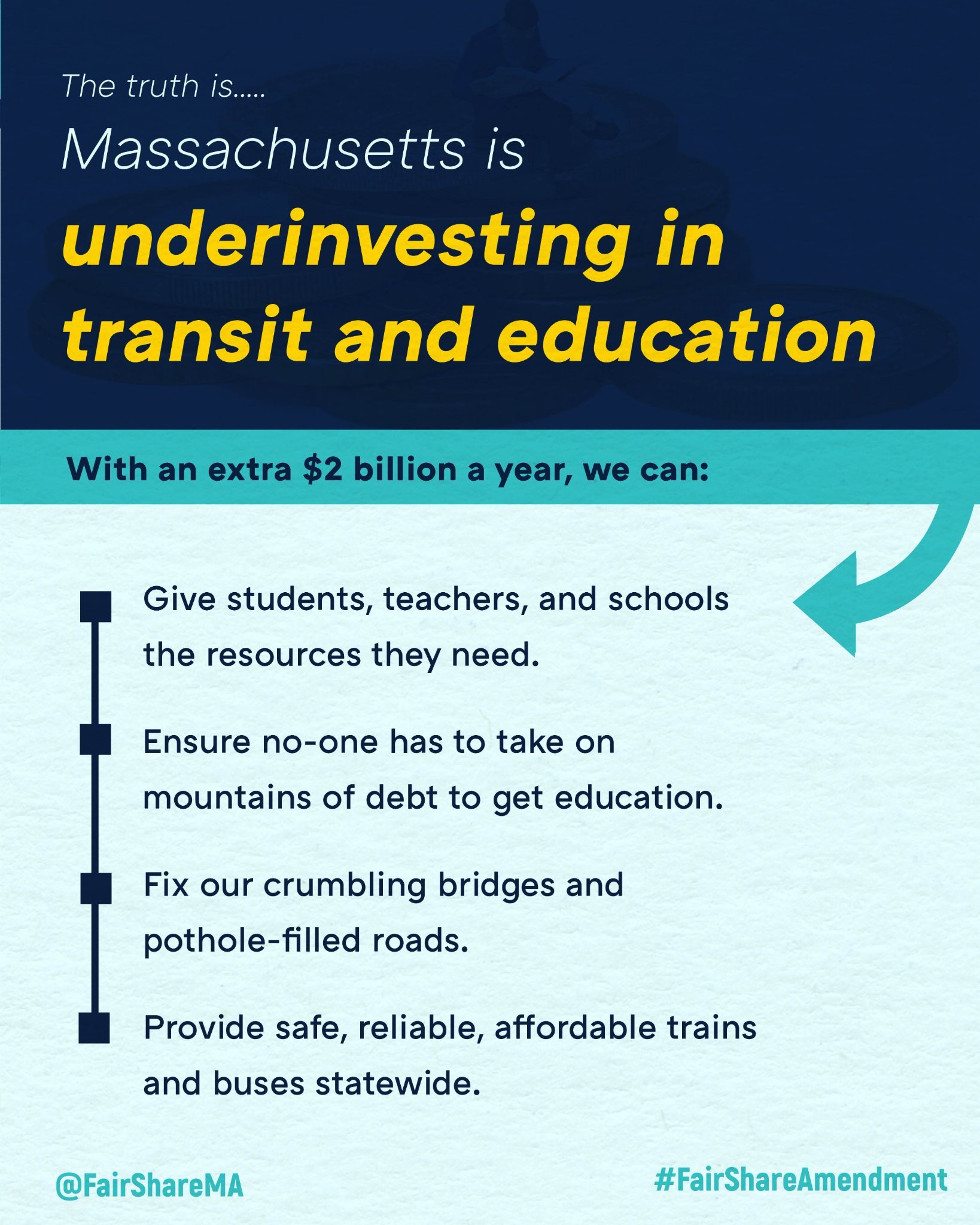The Fair Share Amendment will allow Massachusetts to improve our transportation and public education systems by making the very* rich pay their fair share.
* Only people who earn more than $1 million annually will be impacted; 99% of us won’t pay a penny more. And we’ll all benefit from better schools, roads, bridges, and public transportation.
• Right now, the highest-income households in Massachusetts pay a smaller share of their income in taxes than the rest of us. During the pandemic, the gap between the rich and everyone else got even worse. As a result, too many families in Massachusetts can’t make ends meet, even though we are all working harder than ever before.
• The Fair Share Amendment would only raise taxes on the top 1 percent of Massachusetts households: those who earn more than a million dollars in a single year. They can clearly afford to pay a little more – just 4 cents a dollar on the portion of their annual income above one million dollars – to make the investments we all need to deliver broadly shared prosperity.
Responses to address opposition and concerns:
How will we know the money will really be spent on transportation and education?
Answer: The state constitution is binding on the legislature, and the Fair Share Amendment creates an ironclad dedication that the funds raised by the amendment must be spent on those two areas. The Legislature has a long, unfunded wish list of transportation and public education investments, but we need the Fair Share Amendment to pay for them.
Locally we know how dire these needs are as well!
~ ~ ~
Do we really need this money? The state has a historic budget surplus and billions of dollars in federal aid.
Answer: The Fair Share Amendment goes beyond one budget or one economic cycle. There have been economic upturns and downturns before, and there will be again: many experts are warning that we’re headed for a recession soon. Massachusetts can’t hire more teachers and counselors, reduce college tuition and student debt, or commit to the major investments we need in our transportation system with one-time budget surpluses and short-term windfalls. We need sustainable, long-term revenue that doesn't require low- and middle-income families to pay more.
Plus, our local community, like many gateway cities, rarely sees such a surplus and continues to have unique needs for infrastructure and education.
~ ~ ~
Won’t this tax will hit small business owners who are already struggling to recover from the effects of the pandemic.
Answer: That’s a scare tactic, but it’s not true. The Fair Share Amendment is a tax on personal income over $1 million – business taxes would not increase. It doesn’t matter how much revenue or profit a business has: only business owners or shareholders who earn more than $1 million in personal income in a single year will pay more. Less than 3 percent of small business owners in Massachusetts have taxable personal income over $1 million that would be subject to the Fair Share Amendment.
Every business in Massachusetts will benefit when our communities have better schools and colleges that prepare a well-educated workforce, and a more reliable transportation system that gets employees to work and goods to market.
~ ~ ~
Won’t this tax hit middle-class homeowners and family farmers when they sell their million-dollar property, their only source of wealth?
Answer: You’d have to sell a home for much more than a million dollars to be affected by the Fair Share Amendment. When you sell your home, you don’t pay income taxes on the amount the house sold for. Instead, you pay tax only on the capital gain (the increase in the home’s value between when it was purchased and when it was sold), minus any deductions, including the cost of improvements (such as a renovated kitchen, or a new furnace or roof), and a $500,000 deduction for couples ($250,000 for individuals) if a property is the taxpayer's primary residence. The bottom line: only a very small percentage of home sellers would see their taxable income pushed over $1 million – and anyone making that much money in a single year can afford to pay an additional 4 percent on just the portion of their total taxable income above $1 million.
Plus, it’s about those families that were often the first line of defense in the pandemic and have significant needs now and in the future that will benefit from an equitable system that the Fair Share Amendment can help bring about. This is about uplifting a broader base of people statewide and in our communities. It will not otherwise create an undue burden.
The Fair Share Amendment on the November ballot would create an additional tax of four percent on the portion of a person’s annual personal income above $1 million. The new revenue, $2 billion a year, is required to be spent on quality public education and affordable public colleges and universities, and for the repair and maintenance of roads, bridges and public transportation.
• The rich got richer during the COVID pandemic, but working families and small businesses continue to get hit hard. The Massachusetts economy is working great for those at the top, but that prosperity isn’t reaching all of us. As we come out of the pandemic, we need to make our tax system fairer in order to grow our economy and make it work for everyone.
• As we recover from COVID, we need investments in our public schools to help students get back on track, and to ensure that all students have access to a complete and well-rounded education. We need to repair our state’s backlog of hundreds of neglected and structurally dangerous bridges, roads, and public transportation infrastructure. We need to make our public colleges affordable again so students can graduate without taking on enormous debt. And greater access to vocational education is essential as we rebuild our economy for working families.
• If we don’t address these problems now, they’ll only hold back our economy and hurt working families. It’s time for the very rich to pay their fair share so we can recover from the pandemic and rebuild a Massachusetts economy that’s stronger than ever.
• This November, people from all walks of life are coming together to create better schools and transportation. With the Fair Share Amendment, we can make the Massachusetts tax system fairer and make the big investments we’ve been putting off: new public-school buildings with great educators, safer roads and bridges, affordable public college, access to vocational education and job training programs, fast and reliable public transportation, and pre-K classrooms for every child.
Addressing opposition and concerns, continued:
Won’t Millionaires and the businesses they run will just leave the state?
Answer: This question has been extensively researched and the truth is, only a very small number of millionaires move to avoid paying more taxes. That’s because very high-income people tend to be older, married, with children, and embedded in their communities and the local business networks that have created their wealth. They’re not going to uproot their families to avoid an additional 4% tax on just a portion of their income, because they can easily afford to pay more without affecting their spending and quality of life. After all, a great thing about being rich is that you can afford to live where you want. States (like CA & NY) with the highest tax rates on million-plus dollar incomes have the most million-dollar income households.
Investments in transportation and public education will help improve the quality of life for all of us, including millionaires and business owners, and make Massachusetts a better place to build businesses and attract employees.
~ ~ ~
Why do we need to amend the Constitution to do this/Why does this have to be a ballot question?
Answer: The Massachusetts constitution only allows income to be taxed at one flat rate, currently 5
percent. This means that under existing law, if Massachusetts attempted to raise the income tax for the very rich, it would also affect low- and middle-income people — working people who already pay their fair share. The Fair Share Amendment would amend the state constitution (something that has been done 120 times over the years) to create a single additional tax of four percentage points on the portion of a person’s annual income above $1 million—just 4¢ per $1 over their first $1 million. This ensures that we can improve our transportation and public education systems without asking the middle-class or low-income taxpayers to pay a penny more.
We have seen how inequities in our systems can impact working families, especially during the pandemic. After such tragedy and loss, the Fair Share Amendment is a solution that addresses fiscal responsibility and equity at the same time, finally helping level the playing field for all parts of our state to manage current and emerging needs, and innovate for generations to come.






